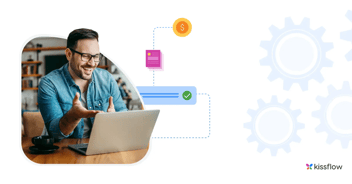
- >
- Application Development >
- 8 Tips for Choosing the Best App Development Firm for your Enterprise Business
8 Tips for Choosing the Best App Development Firm for your Enterprise Business
Team Kissflow
Updated on 28 Apr 2025 • 5 min read
Application development covers the steps and tools involved in developing an app—from its design and creation to its testing, launch, and maintenance.
A business app is a set of programs that carries out a variety of functions needed by an individual or an entire business. Companies can develop them in-house or buy them off the shelf or through app development firms, which tailor-fit solutions to their requirements. These online application development platforms can connect employees or teams within a business (internal apps), one organization to another (business-to-business or B2B apps), or a company to its consumers (business-to-consumer or B2C apps)
How does app development benefit organizations?
With greater accessibility to such platforms, even the smallest business entities use automation and other IT solutions to reach more people and offer more services at a lower cost. Small businesses may use three to five apps to launch their ventures. Meanwhile, a company with more than 2,000 employees uses an average of 211 apps.
Here are four ways in which apps and app development firms can help meet your goals and give your brand a competitive edge:
Higher efficiency
Once the company completes integration and setting adjustments with you, a platform's automation features save and remember information and apply it consistently. This results in accuracy and quality assurance.
Moreover, analytics-equipped platforms can help you improve internal (staff performance) and external (customer engagement) operations.
Increased productivity
Collaboration apps can reportedly raise your teams' productivity by 30 percent. Mobile-ready apps can further improve productivity because your team members can retrieve, exchange, and save files or information needed to fulfill a project anywhere.
Heightened security
App developers use authorization techniques to protect your business and customers’ data.
Learn more: Application development security in 2023
Cost savings
A user-friendly B2B or B2C app can serve as an advertising tool, which could help cut your marketing costs. Also, apps with business and market intelligence allow your company to forecast trends so you can adjust your strategy and reallocate resources appropriately.
Learn more: How Much Does it Cost to Develop an App in 2023?

Choosing Your App Development Stack: A 11-Point Checklist
Thanks for Downloading!
How to Choose the Right App Development Company for Your Business
An app development team can design a platform whose features perfectly match your specific processes instead of you adjusting to pre-built functionalities. Moreover, you can call for modifications and updates on demand instead of waiting for brands of ready-made products to release them. Custom apps typically pay for themselves in the long run.
To determine the right developer to partner with, consider these eight steps to choose the best app development firm for your business needs:
1. Clarify your goal and form a selection team
Your selection team may include the heads or point persons from departments who documented pain points (theirs or their customers) that your future app will aim to resolve.
Your team should also understand technical requirements, risk assessments, security, and budget. Thus, it will be best for your CIO/CTO and a representative of your procurement, legal, HR, and finance departments.
Discuss your target results and whether the app will be a one-time project or a part of your long-term digital transformation. Then establish your selection criteria:
Functionality: the skills gap or technology that the future service provider will fill
Vendor stability: prospect’s industry experience, profitability, and company culture
Support: whether they can ensure a smooth project transition through knowledge-sharing, staff training, and ongoing support
Pricing model: the alignment of their pricing plan and contract or licensing terms with your budget and expectations
2. Check referrals and reviews
Verify the solutions developed for other companies, their strengths and weaknesses, how they communicate and handle projects, and whether they excel in short-term or end-to-end processes.
3. Prioritize app development companies offering services for the whole cycle of app development.
Besides going through their work portfolio, check the vendors' full-service suite. The best one will typically offer market analysis and research, prototyping, UX design, native mobile app and API development and integration, testing, post-release support, and maintenance.
4. Flesh out your request for proposal (RFP).
Potential vendors can make a more accurate estimate and proposal when you describe your product in-depth. A thorough RFP will also make it easier for you to compare prospects without fear that, in the end, your chosen partner misunderstood your desired scope of work.
5. Study their development methodology.
The two most common app development methodologies are waterfall and agile. The waterfall method breaks down the development of apps into phases, each of which should be completed before moving to the next.
Meanwhile, agile promotes the simultaneous development of a project's different stages. A trustworthy prospect will be willing to adjust to your methodology.
6. Meet the development team before sealing a formal agreement.
Your future partner should clarify the number of experienced team members who will work on your project. Note that app development companies with a large workforce may put you last in their customer queue. On the other hand, picking a smaller firm might draw the attention of its CEO to your RFP, but it might also result in a higher asking price.
Before onboarding, ask for the CVs of all the people who could take part in developing your app. When you meet the team, ask about their experience building an app for your specific niche, the time needed for app development, their communication channels, and what documentation they provide.
7. Ask about intellectual property and privacy measures.
Your business contract must state who will hold the app’s intellectual property rights once the development company completes the project. You and the outsourced company should also sign a non-disclosure agreement to ensure that both sides will preserve the confidentiality of sensitive information related to your app. Moreover, prepare a non-compete agreement (NCA) to prevent your chosen firm from revealing your ideas to competitors. The firm may have to delay partnerships with potential competitors for an agreed timeframe as part of the NCA.
Also equally important, your prospective tech partner must offer enterprise-grade security through regular updates, encryption measures, and firewall protection.
8. Divide your project into segments and start with a trial contract.
A trial contract with a defined scope of work will allow you to test your potential vendor in action. Working with the developers for a month or two will help gauge whether you'll be comfortable working with the company long-term.
Ultimately, the final product should be an app that's easy to install, learn, and maintain, compatible with your other systems, and functionally stable.
Don’t know how to code? You can still build apps without depending on IT.
Case Studies: How Kissflow Helped Elevate Brands
Kissflow has empowered businesses to optimize operations through its various applications. Let's look at how these apps benefitted the following companies:
Enjoy Fitness
The growing clientele of Enjoy Fitness, a custom sportswear brand for runners and cyclists based in South Africa, needed a better way to see its orders go through design to invoicing in volumes of over a hundred at a time. Kissflow replaced its former process, which relied on emails and spreadsheets, through its workflow management app.
Sucuri
Website security company Sucuri used to coordinate its employees' travel through email exchanges. Using Kissflow's travel request app, it became easier to handle its staff members' document needs— from itineraries to promotional brochures—for conferences, sales visits, and team meetings.
JourneyOne
Australian business consultancy JourneyOne tapped Kissflow to keep track of their clients' contract status. The platform's contract extension app improved the firm's system, which relied on calendars and emails to remind them of renewal dates and secure approvals.
Partner with Kissflow to Shine in Your Niche
Startups and large entities in every sector have come to accept that having their own customized apps and other digital solutions is necessary to survive in the market. Our tips and insights aim to ease the challenge of finding an experienced app development firm that will build you an excellent business product.
Learn more about Kissflow and how our enterprise application development can help your business achieve new heights.
Start building your own apps with Kissflow

Process Automation - Transforming Complexity to Productivity
Thanks for downloading!
Related Articles











